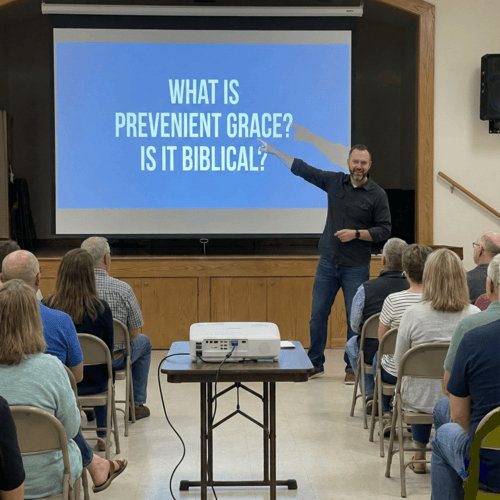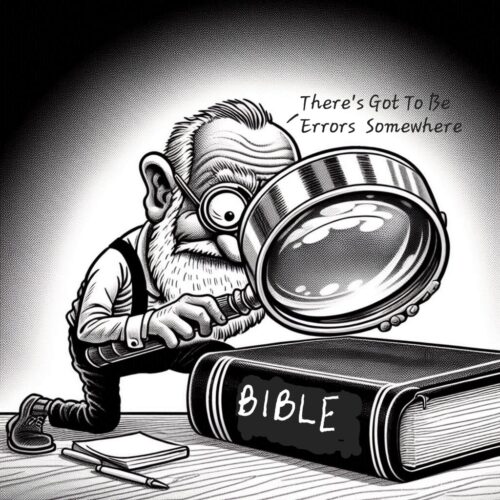Bible Inerrancy Explained: Answering Today’s Toughest Challenges
For Christians, the doctrine of biblical inerrancy remains foundational. Even central. The stakes couldn’t be higher. After all, if Scripture contains errors, how can we trust its claims about Christ’s resurrection, God’s nature, or our eternal destiny? As theologian RC Sproul pointedly asked, “How do you know you’re God’s child? Because the Bible says so. What if the Bible is wrong?”
The 1978 Chicago Statement on Biblical Inerrancy remains our clearest articulation of this doctrine. Yet today’s challenges—from quantum physics to archaeological findings, from textual variants to ancient Near Eastern parallels—demand fresh engagement with this timeless truth.
DEFINING BIBLE INERRANCY
Biblical inerrancy affirms Scripture is completely true and inerrant in all it affirms—not just in matters of faith and practice, but in all its declarations, including historical and scientific claims when properly understood in their intended sense.
What Inerrancy Does Mean: Scripture is truthful in all it asserts (Psalm 119:160: “The sum of your word is truth”). Its authority extends to all subjects it addresses. Each word was divinely inspired (2 Timothy 3:16-17), and Scripture’s claims are historically reliable
What Inerrancy Doesn’t Mean: Inerrancy doesn’t mean the Bible uses technical scientific language. Neither does it mean every statement in it is to be taken literally, or that translations are entirely without error.
THE HISTORICAL FOUNDATION
The Reformed tradition’s stance on inerrancy flows from the conviction that God cannot lie (Titus 1:2, Hebrews 6:18). The Westminster Confession articulates this beautifully: “The authority of the Holy Scripture… dependeth… wholly upon God (who is truth itself) the author thereof; and therefore it is to be received, because it is the Word of God” (WCF 1.4).
BB Warfield, whose defence of inerrancy remains pivotal, argued: “The Bible is the Word of God in such a way that when the Bible speaks, God speaks.” This position wasn’t novel but reflected the church’s historic understanding from the apostolic age through the Reformation.
John Calvin himself insisted: “We owe to Scripture the same reverence which we owe to God because it has proceeded from Him alone… and has nothing belonging to man mixed with it.”
MODERN ARGUMENTS FOR INERRANCY
Theological Arguments
- Christ’s high view of Scripture: Jesus consistently treated Scripture as entirely truthful and authoritative, declaring “Scripture cannot be broken” (John 10:35) and basing entire theological arguments on how every word in the Bible is reliable: as seen in His discussion of Psalm 110 (Matthew 22:43-45). His affirmation of controversial Old Testament accounts, including Jonah and Noah, demonstrates He viewed these as historical fact rather than mere allegory. Perhaps most significantly, Jesus declared that not even the smallest letter would pass away from the Law (Matthew 5:18), showing His complete trust in Scripture’s detailed accuracy.
- The argument from divine truthfulness flows naturally from God’s character. Since God is truth itself (John 14:6) and Scripture repeatedly affirms He cannot lie (Numbers 23:19, Titus 1:2), it follows that His written word must share this attribute of perfect truthfulness. When Paul declares all Scripture is “God-breathed” (2 Timothy 3:16), he’s affirming that every word carries divine authority and truthfulness.
- The unity of divine authorship: While human authors wrote from their distinct perspectives and personalities, the Holy Spirit’s superintendence ensured their writings were exactly what God intended (2 Peter 1:20-21). This remarkable cooperation preserved both human authenticity and divine authority in a way that defies naturalistic explanation. The result is a unified message across diverse genres, cultures, and centuries.
Textual Arguments
- The manuscript evidence for biblical reliability continues to grow stronger. With over 5,800 Greek New Testament manuscripts, we possess far more documentation than for any other ancient text, allowing for exceptional confidence in our modern translations. The Dead Sea Scrolls’ discovery revolutionised our understanding of Old Testament transmission, confirming the incredible accuracy of medieval Hebrew manuscripts. The sheer volume and early dating of biblical manuscripts sets Scripture apart from all other ancient literature.
- Archaeological confirmation repeatedly validates biblical historical claims. Recent discoveries like the Tel Dan Inscription confirming David’s dynasty, Hezekiah’s tunnel matching the account in 2 Kings 20:20, and evidence of Pontius Pilate’s governorship have silenced many critical voices. Perhaps most notably, the once-doubted existence of the Hittite empire has been conclusively proven, demonstrating how archaeology often catches up to biblical claims rather than disproving them.
- The Bible’s internal consistency presents compelling evidence for divine authorship. Despite being written over 1,500 years by dozens of authors from various cultural backgrounds and educational levels, Scripture maintains remarkable unity in its metanarrative of redemption, its portrayal of God’s character, and its ethical teachings. The intricate fulfillment of prophecies, written centuries apart, defies naturalistic explanation and points to divine orchestration.
- Literary and historical accuracy further supports inerrancy. Luke’s precise historical references in Acts have been repeatedly vindicated by archaeological discoveries, while the Bible’s accurate portrayal of ancient customs, practices, and political structures demonstrates intimate familiarity with the periods described. The geographic details throughout Scripture consistently align with archaeological findings, often providing information about locations and features unknown to modern scholars until relatively recently.
ADDRESSING CONTEMPORARY CHALLENGES
Scientific Challenges
- Genre considerations affirm Genesis 1-2 as historical narrative, written to be understood plainly by its original readers. Just as Scripture presents other historical accounts, the creation account provides a literal, chronological record of God’s work in six ordinary days.
- Framework interpretation, which suggests Genesis 1-2 is a metaphorical or symbolic account rather than literal history, is unnecessary when we accept Scripture’s plain teaching about creation. As Jesus Himself referred to Adam and Eve as historical figures (Matthew 19:4-5), we can confidently embrace the straightforward reading of Genesis 1-2 as accurate history.
- Proper hermeneutics leads us to accept the Bible’s clear teaching about a young earth and recent creation. While evolution-influenced science may challenge this view, we must remember that “by faith we understand that the universe was created by the word of God” (Hebrews 11:3).
- The limits of scientific inquiry remind us that historical science, dealing with unrepeatable past events, depends heavily on assumptions. When current scientific models conflict with Scripture’s clear teaching, we must trust God’s eyewitness account over human interpretations of evidence.
Historical Challenges
- Ancient Near Eastern context reveals how Genesis provides the true account while pagan myths offer distorted reflections of actual events. Where other cultures constructed elaborate mythologies, Scripture presents sober historical truth.
- Biblical historiographical methods demonstrate remarkable precision while following ancient conventions. When properly understood, apparent discrepancies in numbers or chronology reflect intentional literary choices rather than errors.
- Recent archaeological support increasingly validates biblical claims. Discoveries continue to confirm Scripture’s historical reliability, even in previously contested details.
Cultural Challenges
Postmodern truth claims falter before Scripture’s absolute truth, grounded in God’s unchanging character (Malachi 3:6). Scripture provides objective truth in an age of relativism. Cultural relativism incorrectly suggests ancient texts can’t speak authoritatively today. Scripture transcends cultural boundaries because it comes from God Himself.
The question of authority remains central as modern culture rejects external standards. Scripture’s divine authorship establishes its permanent authority regardless of human opinion. The Bible’s relevance for today’s church continues undiminished, providing timeless principles for addressing even the newest ethical and social challenges.
CONCLUSION
Bible inerrancy isn’t merely an academic doctrine but a foundational truth that undergirds our entire faith. As we’ve seen, the challenges to inerrancy—whether scientific, historical, or cultural—ultimately strengthen rather than weaken our confidence in Scripture’s complete truthfulness.
The Bible’s self-attestation, Christ’s own view of Scripture, and the mounting archaeological evidence all point to the same conclusion: God has preserved His Word as He promised. When properly understood, Scripture shows itself to be exactly what it claims to be—the inerrant Word of God (2 Timothy 3:16).
The words of Christ ring as true today as ever: “Heaven and earth will pass away, but my words will not pass away” (Matthew 24:35). In an age of shifting truth claims and moral uncertainty, we can stand confidently on the inerrant Word of God—our sure foundation for faith and life.
BIBLE INERRANCY—RELATED FAQS
What’s the difference between inerrancy and infallibility? Infallibility means Scripture will not fail in achieving its purpose of bringing people to salvation and teaching truth about God. Inerrancy makes the stronger claim that Scripture is completely without error in everything it affirms, including historical and scientific statements. While all who hold to inerrancy believe in infallibility, not all who accept infallibility embrace full inerrancy.
- What about apparent contradictions in the Bible? Apparent contradictions often arise from our incomplete understanding rather than actual errors. For instance, when Chronicles and Samuel give different numbers for similar events, these can often be explained by different counting methods, different categories being counted, or scribal transmission variations. The key principle is that Scripture’s original autographs were without error, even if we sometimes struggle to harmonize difficult passages.
- If we don’t have the original manuscripts, how can we claim inerrancy? While we don’t possess the original autographs, we have such a vast number of manuscripts that scholars can reconstruct the original text with remarkable accuracy. The variations between manuscripts are minor and don’t affect any major doctrine. Furthermore, inerrancy of the originals provides the basis for why we meticulously preserve and transmit Scripture.
Does inerrancy require a specific method of interpretation? Inerrancy doesn’t dictate a single interpretive method, but it does require us to take seriously the Bible’s various genres and literary devices. For example, when Psalms speaks of mountains clapping their hands, inerrancy doesn’t demand a literal interpretation of mountains having hands. The text is inerrant in conveying the truth it intends to communicate.
- How does inerrancy address differences in Gospel accounts? Different Gospel accounts reflect different eyewitness perspectives and theological emphases, similar to how multiple witnesses of an accident might highlight different details while all telling the truth. These variations actually strengthen the Bible’s credibility by showing independent testimony rather than collusion, while maintaining truthfulness in all they affirm.
- Why do some scholars reject inerrancy while accepting the Bible’s authority? Some scholars argue for a limited authority of Scripture, claiming it’s authoritative only in matters of faith and practice but not in historical or scientific statements. However, this creates an artificial division—if Scripture can’t be trusted in verifiable areas like history, how can we trust it in unverifiable areas like salvation? As Jesus said, “If I have told you earthly things and you do not believe, how can you believe if I tell you heavenly things?” (John 3:12).
Does inerrancy mean every statement in the Bible is literally true? No. Inerrancy means that every statement in Scripture is true in accordance with its intended meaning. The Bible includes figures of speech, approximations, phenomenological language (describing things as they appear), and different genres. For example, when Jesus says He is the “door” (John 10:9), inerrancy doesn’t require us to believe He has hinges and a handle. The statement is inerrantly true in its intended metaphorical sense.
BIBLE INERRANCY—OUR RELATED POSTS
Editor's Pick

Prevenient Grace: 5 Reasons the Doctrine Fails
Can a spiritually dead person choose God? It’s one of the oldest questions in Christian theology. And how we answer [...]

Why Do People Hate the Doctrine of Election?
…WHEN THEY REALLY SHOULDN’T Few Bible doctrines provoke stronger reactions than election. The idea that God chose some for salvation [...]

The Doctrine of Providence: Does God Really Govern All Things?
You’re sitting in the doctor’s office when the diagnosis lands like a thunderclap. Your mind races: Why this? Why now? [...]
SUPPORT US:
Feel the Holy Spirit's gentle nudge to partner with us?
Donate Online:
Account Name: TRUTHS TO DIE FOR FOUNDATION
Account Number: 10243565459
Bank IFSC: IDFB0043391
Bank Name: IDFC FIRST BANK






